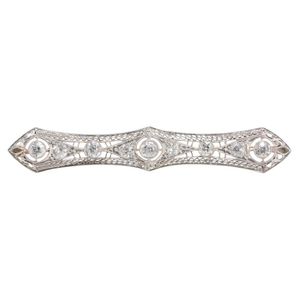Art Deco Diamond Bar Brooch
An Art Deco diamond brooch, of elongated bar design, centring five collet-set old European-cut diamonds and four claw set old European-cut diamonds, altogether totalling an estimated 1.20 carats, set throughout in millegrain settings, diameter approximately 65 mm.
You must be a subscriber, and be logged in to view price and dealer details.
Subscribe Now to view actual auction price for this item
When you subscribe, you have the option of setting the currency in which to display prices to $Au, $US, $NZ or Stg.
This item has been sold, and the description, image and price are for reference purposes only.
- Art Deco Period - The Art Deco period was a cultural movement that emerged in the 1920s and 1930s, and was characterized by its emphasis on modernism, luxury, and elegance. The name "Art Deco" comes from the Exposition Internationale des Arts Décoratifs et Industriels Modernes, a large exhibition held in Paris in 1925 that showcased the latest trends in decorative arts.
Art Deco was a reaction against the ornate and elaborate styles of the previous era, and reflected a new modern sensibility. It was characterized by streamlined, geometric shapes, bright colours, and the use of new materials such as chrome, glass, and Bakelite. Art Deco designers sought to create a sense of luxury and sophistication, often incorporating expensive materials such as ivory, marble, and rare woods.
Art Deco had a significant impact on a wide range of artistic fields, including architecture, fashion, graphic design, and interior design. Some of the most iconic examples of Art Deco architecture include the Empire State Building in New York City, the Hoover Building in London, and the Palais de Chaillot in Paris.
The Art Deco period came to an end in the 1940s, as World War II and changing cultural trends led to a shift in artistic styles. However, Art Deco remains an important influence on design and art, and continues to be celebrated for its modernist sensibility and glamorous aesthetic. - Millegrain - A type of jewellery setting where the stone is held is held in position by small adjacent beads of metal. This method of securing the stone was popular in the 19th century.
This item has been included into following indexes:
